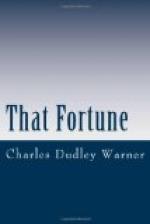VII
The name of Thomas Mavick has lost the prominence and significance it had at the time the events recorded in this history were taking place. It seems incredible that the public should so soon have lost interest in him. His position in the country was most conspicuous. No name was more frequently in the newspapers. No other person not in official life was so often interviewed. The reporters instinctively turned to him for information in matters financial, concerning deals, and commercial, which were so commonly connected with political, enterprises. No loan was negotiated without consulting him, no operation was considered safe without knowing how he was affected towards it, and to ascertain what Mavick was doing or thinking was a constant anxiety in the Street. Of course the opinion of a man so powerful was very important in politics, and any church or sect would be glad to have his support. The fact that he and his family worshiped regularly at St. Agnes’s was a guarantee of the stability of that church, and incidentally marked the success of the Christian religion in the metropolis.
But the condition of the presence in the public mind of the name of a great operator and accumulator of money who is merely that is either that he go on accumulating, so that the magnitude of his wealth has few if any rivals, or that his name become synonymous with some gigantic cleverness, if not rascality, so that it is used as an adjective after he and his wealth have disappeared from the public view. It is different with the reputation of an equally great financier who has used his ability for the service of his country. There is no Valhalla for the mere accumulators of money. They are fortunate if their names are forgotten, and not remembered as illustrations of colossal selfishness.
Mavick may have been the ideal of many a self-made man, but he did not make his fortune—he married it. And it was suspected that the circumstances attending that marriage put him in complete control of it. He came into possession, however, with cultivated shrewdness and tact and large knowledge of the world, the world of diplomacy as well as of business. And under his manipulation the vast fortune so acquired was reported to have been doubled. It was at any rate almost fabulous in the public estimation.
When the charming widow of the late Rodney Henderson, then sojourning in Rome, placed her attractive self and her still more attractive fortune in the hands of Mr. Thomas Mavick, United States Minister to the Court of Italy, she attained a position in the social world which was in accord with her ambition, and Mavick acquired the means of making the mission, in point of comparison with the missions of the other powers at the Italian capital, a credit to the Great Republic. The match was therefore a brilliant one, and had a sort of national importance.




